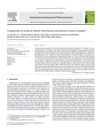32 citations,
January 2017 in “Physiology & Behavior” New hair growth corticosterone levels are higher in diabetic mice, indicating long-term stress.
February 2024 in “Neurophotonics” Light therapy on the brain shows promise for treating brain diseases and improving brain function.
1 citations,
October 2022 in “Evidence-based Complementary and Alternative Medicine” Traditional Chinese Medicine may help treat hair loss but needs more research.
 18 citations,
April 1986 in “International Journal of Cosmetic Science”
18 citations,
April 1986 in “International Journal of Cosmetic Science” Minoxidil promotes hair regrowth in early baldness stages and prevents baldness in non-bald scalps.
 70 citations,
February 2015 in “Expert Opinion on Drug Discovery”
70 citations,
February 2015 in “Expert Opinion on Drug Discovery” Topical drugs and near-infrared light therapy show potential for treating alopecia.
 41 citations,
July 2015 in “Current Drug Discovery Technologies”
41 citations,
July 2015 in “Current Drug Discovery Technologies” Some plants may help with hair growth and have fewer side effects than synthetic drugs, but more research is needed to confirm their effectiveness.
 28 citations,
March 2019 in “Journal of Dermatological Science”
28 citations,
March 2019 in “Journal of Dermatological Science” The document concludes that while lab results for hair growth promotion are promising, human trials are needed and better testing methods should be developed.
 26 citations,
December 2016 in “Pharmacology & Therapeutics”
26 citations,
December 2016 in “Pharmacology & Therapeutics” New drugs for heart disease may be developed from molecules secreted by stem cells.
 1 citations,
December 2016 in “Trichology and cosmetology:”
1 citations,
December 2016 in “Trichology and cosmetology:” Panax ginseng might help with hair growth and has fewer side effects than synthetic treatments.
 22 citations,
January 2018 in “Experimental Dermatology”
22 citations,
January 2018 in “Experimental Dermatology” The meeting focused on understanding, diagnosing, and finding treatments for irreversible hair loss diseases.
 7 citations,
October 2006 in “Medical hypotheses”
7 citations,
October 2006 in “Medical hypotheses” UV light might cause excessive hair growth by increasing PGE2 in the skin.
 165 citations,
August 2013 in “Lasers in Surgery and Medicine”
165 citations,
August 2013 in “Lasers in Surgery and Medicine” Low-Level Laser Therapy is effective and safe for hair growth with minimal side effects.
 104 citations,
January 2016 in “Food & Function”
104 citations,
January 2016 in “Food & Function” Olive oil compounds may help prevent cancer in animals, but human results are mixed.
 65 citations,
January 2011 in “Frontiers in Endocrinology”
65 citations,
January 2011 in “Frontiers in Endocrinology” Neurosteroids show promise for treating epilepsy and more research is needed.
 49 citations,
January 2018 in “Theranostics”
49 citations,
January 2018 in “Theranostics” The new skin patch with human matrix and antibiotic improves wound healing.
 49 citations,
September 2008 in “International journal of pharmaceutics”
49 citations,
September 2008 in “International journal of pharmaceutics” Artificial sebum L closely mimics human sebum for drug delivery research.
 31 citations,
September 2008 in “International Journal of Andrology”
31 citations,
September 2008 in “International Journal of Andrology” 5-alpha-reductase inhibitors may cause a low incidence of erectile dysfunction that decreases over time.
 19 citations,
January 2009 in “Journal of Young Pharmacists”
19 citations,
January 2009 in “Journal of Young Pharmacists” Alcoholic extract of Eclipta alba may help treat allergies and is safe at high doses.
 11 citations,
January 2018 in “RSC Advances”
11 citations,
January 2018 in “RSC Advances” Cedrol cream is more effective and safe for promoting hair growth than traditional treatments.
 9 citations,
November 2018 in “Drug Discovery Today”
9 citations,
November 2018 in “Drug Discovery Today” Using skin stem cells and certain molecules might lead to scar-free skin healing.
 8 citations,
July 2017 in “Biochemical and biophysical research communications”
8 citations,
July 2017 in “Biochemical and biophysical research communications” A new compound, BOI, can help hair grow by changing hair cycle phases and increasing certain cell contents.
 3 citations,
August 2020 in “International Journal of Molecular Sciences”
3 citations,
August 2020 in “International Journal of Molecular Sciences” Blocking Rab27a slows hair growth, while blocking Rab27b encourages it.
 2 citations,
April 2016 in “Medical Hypotheses”
2 citations,
April 2016 in “Medical Hypotheses” Antioxidants might help prevent pressure ulcers, but more research is needed to find effective ones.
 185 citations,
August 2005 in “Autoimmunity Reviews”
185 citations,
August 2005 in “Autoimmunity Reviews” Alopecia areata is an autoimmune condition causing hair loss due to the immune system attacking hair follicles, often influenced by genetics and stress.
 137 citations,
March 2006 in “Cns Drug Reviews”
137 citations,
March 2006 in “Cns Drug Reviews” Finasteride treats enlarged prostate and hair loss, but may cause side effects in some patients.
 135 citations,
December 2015 in “Expert Opinion on Biological Therapy”
135 citations,
December 2015 in “Expert Opinion on Biological Therapy” Exosomes could potentially enhance tissue repair and regeneration with lower rejection risk and easier production than live cell therapies.
 86 citations,
July 2020 in “International Journal of Molecular Sciences”
86 citations,
July 2020 in “International Journal of Molecular Sciences” Activating the Wnt/β-catenin pathway could lead to new hair loss treatments.
 75 citations,
June 2019 in “International Journal of Molecular Sciences”
75 citations,
June 2019 in “International Journal of Molecular Sciences” Costunolide may have multiple health benefits, including promoting hair growth and protecting against cancer and diabetes, but more research is needed.
 67 citations,
January 2020 in “Cellular & Molecular Immunology/Cellular & molecular immunology”
67 citations,
January 2020 in “Cellular & Molecular Immunology/Cellular & molecular immunology” Tissue-resident memory T cells can protect against infections and cancer but may also contribute to autoimmune diseases.
 60 citations,
September 2015 in “Expert Review of Clinical Immunology”
60 citations,
September 2015 in “Expert Review of Clinical Immunology” Lymphocytes, especially CD8+ T cells, play a key role in causing alopecia areata, and targeting them may lead to new treatments.


























